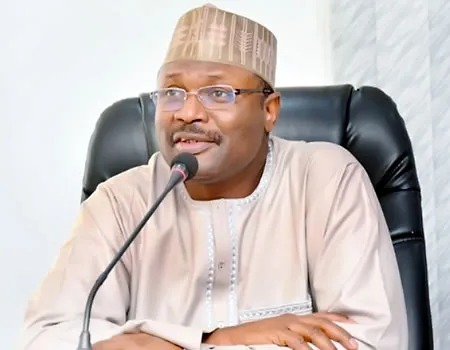INEC Plans Computer-generated Slips For Future Polls
 The Independent National Electoral Commission (INEC) has said going forward, computer-generated slips issued to the voter or even downloaded from its website will suffice for voter accreditation.
The Independent National Electoral Commission (INEC) has said going forward, computer-generated slips issued to the voter or even downloaded from its website will suffice for voter accreditation.
According to the electoral umpire, this will not only save cost but also eliminate the issues around the collection of Permanent Voter’s Card (PVCs) and the “diabolical practice of buying up the cards from voters in order to disenfranchise them.”
INEC chairman Professor Mahmood Yakubu, who said this at a meeting with Resident Electoral Commissioners (RECs) in Abuja on Thursday, however said those who already have PVCs can still use them to vote.
Mahmood said, “The Commission also believes that with the introduction of the Bimodal Voter Accreditation System (BVAS), the use of the Permanent Voters’ Cards (PVC) as the sole means of identification for voter accreditation on Election Day should be reviewed.
“Those who already have the PVCs can still use them to vote, but going forward, computer-generated slips issued to the voter or even downloaded from the Commission’s website will suffice for voter accreditation.
“This will not only save cost, it will also eliminate the issues around the collection of PVCs and the diabolical practice of buying up the cards from voters in order to disenfranchise them,” he said.
The commission’s proposal was supported by Yiaga Africa, which said the plan will address voter disenfranchisement due to delays or challenges in distributing PVCs.
Speaking to the press on Friday about the plan, the executive director Yiaga Africa, Samson Itodo, said “This is an important proposal to enhance voter participation and reduce disenfranchisement.
“Allowing voters to cast their ballots with an official form of ID, as long as their names appear on the register and their biometrics can be verified through the BVAS, addresses a critical issue in Nigeria’s electoral process—voter disenfranchisement due to delays or challenges in distributing Permanent Voter Cards (PVCs)”, Itodo added.
However, Yakubu, at the meeting with the RECs, also disclosed that very soon, the commission will make a presentation to the Joint Committee of the Senate and House of Representatives on Electoral Matters as they continue to deliberate on electoral reform.
He said the meeting will focus on the more detailed issues of planning and reform learning from the experience of the 2023 General Election.
“Having released our 524-page main report on the election, a copy of which is available on our website, we have consulted widely internally with our own officials and externally with all major stakeholders.
“With the conclusion of five major off-cycle Governorship elections and nine out of 21 bye-elections since the 2023 General Election, this is the most appropriate time for us to commence the implementation of the recommendations arising from our review of the General Election,” the chairman said.
He said from the internal and external engagements, the commission has identified 142 recommendations dealing with the general state of preparedness, voter management, voter education and public communication, political parties and candidate management and electoral operations and logistics management.
Yakubu said other areas include election officials and personnel, partnership and collaboration, monitoring and supervision, election technology, voting and result management, election security, electoral offences and the electoral legal framework.
“Out of the 142 recommendations, 86 require administrative action by the Commission. It is therefore pertinent that we engage first with our Resident Electoral Commissioners (RECs) because of your frontline role in the implementation of the recommendations.
“This is followed by 48 recommendations that require action by a variety of stakeholders, including security agencies, mobile network operators, statutory bodies, political parties, transport unions, civil society organisations and the media.
“On the legal review, there are eight recommendations that require legislative action by the National Assembly. Very soon, the Commission will make a presentation to the Joint Committee of the Senate and House of Representatives on Electoral Matters as they continue to deliberate on electoral reform.
“Among the major highlights of the Commission’s recommendations is the imperative of legal clarity in result management, with regard to manual transfer versus the electronic transmission of results.
“The Commission also believes that with the introduction of the Bimodal Voter Accreditation System (BVAS), the use of the Permanent Voters’ Cards (PVC) as the sole means of identification for voter accreditation on Election Day should be reviewed.
“The review report also contains recommendations on early/special voting for the millions of Nigerians who do not vote at the moment on account of the roles they play during elections such as INEC officials, security personnel, ad hoc staff, observers and journalists who are deployed outside the places where they registered to vote,” he added.
Yakubu said there are also recommendations in support of diaspora voting, the unbundling of the commission with the establishment of electoral offences tribunal and a separate agency to handle the registration and regulation of political parties.
“Similarly, the Commission will step up action on voter access and distribution to Polling Units. As a matter of urgency, the Commission also intends to develop protocols for the cleaning up of the voters’ register in collaboration with other agencies such as the National Identity Management Commission (NIMC) and the National Population Commission (NPC).
“Other areas of reform include advocacy for affirmative action for greater participation of under-represented groups, a more robust voter education and public communication to combat fake news and misinformation.
“Furthermore, the Commission intends to review the mechanisms for a more effective implementation of agreements on logistics with the transport unions and other service providers by consolidating on the recent experience with early deployment and commencement of elections in the recent Ondo State Governorship election,” he noted.
The Professor of History and International Studies also said the hardcopies of the general election and review reports will be presented to the public shortly while its softcopy will also be uploaded to INEC’s website in earnest.













